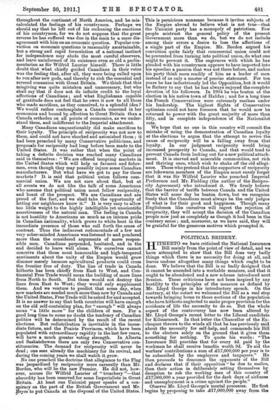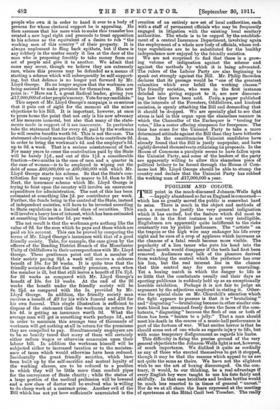POLITICAL BRIBERY. H ITHERTO we have criticised the National Insurance Bill
mainly from the point of view of detail, and we have attempted to show that the Bill does very badly things which there is no necessity for doing at all, and leaves undone altogether many things which ought to be done. We believe that the Bill is so badly designed that it cannot be amended. into a workable measure, and that it ought to be abandoned and a new scheme introduced next Session. These criticisms have not been inspired by any hostility to the principles of the measure as defined by Mr. Lloyd. George in his introductory speech. On the contrary, at the outset we welcomed the Bill as a real step towards bringing home to those sections of the population who have hitherto neglected to make proper provision for the accidents of life the necessity to do so. But the whole aspect of the controversy has now been altered by Mr. Lloyd George's recent letter to the Liberal candidate for Kilmarnock. In that letter the Chancellor of the Ex- chequer throws to the winds all that he has previously said about the necessity for self-help, and commends his Bill to the electors solely on the ground that it gives them something for nothing. To quote his words : " The Insurance Bill provides that for every 4d. paid by the workman he shall receive benefits worth 9d. To aid the workers' contributions a sum of £17,000,000 per year is to be subscribed by the employers and taxpayers." He then proceeds to denounce the opponents of the Bill and declares that if their opposition " be due to malice, then their action in deliberately setting themselves by deception to rob the working men of this country of £17,000,000 a year provided for the dark days of sickness and unemployment is a crime against the people." Observe Mr. Lloyd George's mental processes. Heurst begins by proposing to take £17,000,000 away_ from the people who own it in order to hand it over to a body of persons for whose electoral support he is appealing. He then assumes that his mere wish to make this transfer has created a new legal right and proceeds to treat opposition to his scheme as the equivalent of a desire to rob " the working men of this country " of their property. It is always unpleasant to fling back epithets, but if there is any robbery in the matter surely it lies at the door of the man who is proposing forcibly to take money from one set of people and give it to another. We admit that cases may occur, though we believe they are extremely rare, where this process may be defended as a means of starting a scheme which will subsequently be self-support- ing, but that defence is no longer put forward by Mr. Lloyd George. He no longer argues that the workmen are being assisted to make provision for themselves. His new point is : " Here am I, a great Radical leader, giving you £17,000,000 of other people's money. Vote for my candidate." This aspect of Mr. Lloyd George's campaign is so serious that it puts out of sight for the moment all the minor objections to his Bill. It is important, however, at once to press home the point that not only is his new advocacy of his measure immoral, but also that many of the state- ments made in support of it are inaccurate. In particular take the statement that for every 4d. paid by the workman he will receive benefits worth 9d. This is not the case. The statement obviously means that the State is to contribute 2d. in order to bring the workman's 4d. and the employer's 3d. up to 9d. a week. That is a serious misstatement of fact. For many years to come the contribution paid by the State will be barely ltd., and out of this 11d. a considerable fraction—two-ninths in the case of men and a quarter in the case of women—is to be employed in wiping out the debt of some £60,000,000 or £80,000,000 with which Mr. Lloyd George starts his scheme. So that the State's con- tribution for many years will be nearer to ld. than to 2c1. Next, the insurance scheme which Mr. Lloyd George is trying to foist upon the country will involve an enormous expenditure for administration. The cost of this has been estimated at something like 4d. per contributor per week. Further, the funds being in the control of the State, instead of independent societies, will have to be invested according to State regulations in a limited class of securities. This will involve a heavy loss of interest, which has been estimated at something like another ld. per week.
The net result is that the workman gets nothing like the value of 9d. for the sum which he pays and those which are paid on his account. This can be proved by comparing the terms of Mr. Lloyd George's insurance with that of a good friendly society. Take, for example, the case given by the officers of the Reading District Branch of the Manchester Unity of Oddfellows in their correspondonce with Mr. Lloyd George. These gentlemen point out that a member of their society paying 91d. a week will receive a sickness benefit of 18s. for 26 weeks. It is quite true that the friendly societies deduct the weekly premium, even when the member is ill, but that still leaves a benefit of 17s. 2141. for 26 weeks as compared with Mr. Lloyd George's benefit of 10s. for 13 weeks. At the end of the 26 weeks the benefit under the friendly society will be 8s. VA as compared with the 5s. provided by Mr. Lloyd George. In addition, the friendly society man receives a benefit of £9 for his wife's funeral and £18 for his own funeral. This single illustration is sufficient to dispose of the statement that the workman in return for his 4d. is getting an insurance worth 9d. What the average man will get is something worth perhaps 5d., and in order to maintain this average tens of thousands of workmen will get nothing at all in return for the premiums they are compelled to pay. Simultaneously employers are to be so heavily taxed that many of them will certainly either reduce wages or otherwise economize upon their labour bill. In addition the workman himself will be subjected either to increased taxation or to the mainten- ance of taxes which would otherwise have been reduced. Incidentally the great friendly societies, which have been built up by the self-sacrifice and mutual loyalty of the working classes, are to be reduced to a position in which they will be little more than conduit pipes for the conveyance of State charity ; while the status of a large portion of the medical profession will be lowered and a new class of doctor will be evolved who is willing to do cheap work at a contract price. Another evil of the Bill -which has not yet been sufficiently appreciated is the creation of an entirely new set of local authorities, each with a staff of permanent officials who may be frequently engaged in litigation with the existing local sanitary authorities. The whole is to be capped by the establish- ment of a central Insurance Department, involving again the employment of a whole new body of officials, whose red- tape regulations are to be substituted for the healthy independence now enjoyed by the friendly societies.
We are not surprised to find that there is a grow- ing volume of indignation against the scheme and against the methods by which it is being advocated. The rulers of the Labour Party are also beginning to speak out strongly against the Bill. Mr. Philip Snowden declares that its passage would be " one of the greatest calamities which ever befell the working classes." The friendly societies, who were in the first instance deluded into giving support to it, are now discover- ing how they have been sold. Unity, a paper published in the interests of the Foresters, Oddfellows, and kindred societies, is openly attacking the Bill and demanding that it should be dropped. We are specially glad to see that stress is laid in this organ upon the shameless manner in which the Chancellor of the Exchequer is "touting for votes," like a coster offering ninepence for fourpence. The time has come for the Unionist Party to take a more determined attitude against the Bill than they have hitherto done. In the constituencies Unionist candidates have already found that the Bill is justly unpopular, and have rightly devoted themselves to criticising its proposals. In the House of Commons a paralysis seems to have fallen upon the Unionist Party, and some of the leaders of the party are apparently willing to allow this shameless piece of political bribery to be forced through the House of Com- mons lest Mr. Lloyd George should be able to stump the country and declare that the Unionist Party has robbed the working man of £17,000,000 a year.











































 Previous page
Previous page